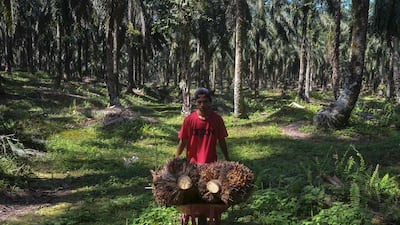Palm oil production has often proved a controversial topic, its links to deforestation and climate change long the focus of global criticism and boycotts, but a more sustainable future could be in sight.
Its uses as a biofuel, cheap cooking oil and as an ingredient in food, cosmetics and detergents mean palm oil is viewed as a wonder commodity with the global market valued at $70.44 billion in 2023 by Grand View Research. However, as vast swathes of tropical forests are destroyed so palm tree plantations can take their place, controversy has surrounded its production.
Many initiatives have been developed to sever palm oil’s links to deforestation, most notably spearheaded by the European Union. This month a company called Daabon, based in Colombia, has taken things a step further by claiming to have produced the world’s first carbon neutral palm oil.
What is being done?
Oil palms are grown primarily in tropical regions, so large areas of tropical rainforests, which are some of the planet's most biodiverse areas, have been felled to allow plantations to be created. These plantations are much less nature-rich than the forests they replace.
The EU has made efforts to ensure the palm oil it imports is not associated with deforestation. At the end of 2025 – a year later than planned – the EU Deforestation Regulation (EUDR) will come into force and will tighten up rules.
Daabon states that, as well as meeting EUDR regulations, the palm oil produced at its Tequendama plant in Colombia has a positive impact in terms of carbon emissions. There are multiple ways in which this is achieved, although Manuel Davila, managing director of the company's UK and EU operations, said these were not unique.
For example, when the crop is crushed, palm oil mill effluent is produced, which is fed into an anaerobic digester, allowing the capture of biogas, which is used to generate power.
Mr Davila said the company uses the residue to produce biomass pellets, which are burnt to generate heat and energy. “We don't buy fertiliser … we make our own fertiliser out of our own biomass residues from the plantation,” he told The National.
The production of fertiliser is usually highly carbon intensive, so creating it locally is said to have a major impact on the palm oil’s carbon footprint. Overall, the unrefined palm oil at the mill is said to have a carbon impact equivalent to minus 977kg of carbon dioxide per tonne. Subsequent processing and transport will, however, generate carbon emissions.
While the -977kg figure does not apply to all of the company’s output, Mr Davila described it as “a very good start” and said the firm was trying to reduce its environmental impact further. “There are a good amount of palm oil companies in Latin America focused on meeting European regulations,” Mr Davila said.
“The sector has definitely made significant strides. It's not a problem about the crop; it's what people did with the crop.”
Indeed Mr Davila described the crop as “a blessing” because of its huge yields: eight times those of soybeans and six times those of sunflowers for a given area of land.
Are the improvements enough?
The Roundtable on Sustainable Palm Oil (RSPO), introduced in 2004 and supported by organisations such as WWF, has helped improve standards in the sector. Yet, OurWorldinData indicates that the amount of land used to grow palm oil, now around 30 million hectares, is continuing to grow.
“I do think the negative publicity on palm oil has contributed to improvements in parts of the industry,” said Matin Qaim, professor of agricultural economics and director of the University of Bonn’s Centre for Development Research. “There are still things happening with too much deforestation and we need to find ways of halting this, but that's not necessarily achieved through a palm oil ban.”
But while more sustainable practices might be used for palm oil sent to parts of the world where environmental concerns are a priority, Prof Qaim said greater efforts are needed for supplies to developing nations.
“You can do many things in a nice way, in a small niche market sector,” he said. “Companies doing that want to grow for the US or Europe. You cannot easily scale up, because the dirty palm oil goes to China.”
Dr Edgar Turner, an associate professor and curator of insects in the University of Cambridge’s Museum of Zoology who has worked on oil palm biodiversity in South-East Asia, described the round-table as the “poster child” for palm oil environmental certification.
However, he listed the Malaysian Sustainable Palm Oil (MSPO) and Indonesia Sustainable Palm Oil (ISPO) certifications as other examples of regional certificates that have resulted in improved practices.
“Once you have a plantation established, it's probably best to keep on managing it in as sustainable way as possible,” he said. “These are things that every industry provider has to sign up to if they're a reasonably sized company. It's changing across the board. They may not be as stringent as the RSPO, but there's a lot of overlap.”
He also said palm oil mills had become “really good at reducing their carbon emissions”. “They use the fruit bunches to power the place. It saves them a lot of money,” he said.
Is net zero possible?
Agriculture as a whole is, however, likely to remain a net creator of carbon emissions, Prof Qaim said, and “will never really be net zero”.
“This is because many of the things that are being grown are burnt or eaten, and you're having inputs and you're having transport,” he said.
“Net zero, especially in the livestock industry [is difficult to achieve] – you're having a lot of methane emissions apart from carbon dioxide emissions that come out of the animals themselves. There will always be some sectors that will be emitting greenhouse gases.
“If we want globally to be at net zero, we need to find sectors and technologies that sequester them. Growing forests is one way of doing that.”


